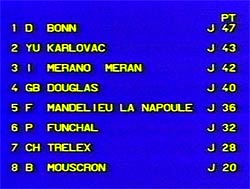|
Recently,
I had the very good fortune to view the International German Heat from the
1979 Jeux Sans Frontičres television series. In all its glorious
colour, with Stuart Hall commentary, I was able to relive the programme
that had aired for the one and only time on BBC television on Tuesday 16th
October 1979.
Watching Jeux Sans Frontičres after all these years
was an incredible feeling. I remembered so many things so clearly, and
long forgotten games entertained me once again. The theme of the programme
was the open air festival and the Bonn audience were incredibly
enthusiastic and really got behind the German Team. They were, however,
also very friendly towards the other nations. This brought back to me the
concept that Jeux Sans Frontičres really were the “friendly” games.
International rivalry in a friendly competition. What a delicious
combination.
The
games took on that familiar pattern of yesteryear – the 1st game had 1
heat, the 2nd game 4 heats, the 3rd game 2 heats, and so on. The costumes
and props for each game were wonderful - I had long forgotten the waiters
on the swinging chandeliers and the revolving couples turning on lights.
Two games I had remembered perfectly – knocking the music sheets off the
music stands in the Fil Rouge and the last game of musical chairs, won by
Douglas, in which Stuart Hall uttered the immortal words “musical chairs
must be the national sport in the Isle of Man!” He had said this as
Douglas had won the game in both rehearsals and on the night. This game
made me understand a very important rule of thumb about Jeux Sans
Frontičres, that some of the best games were the simplest ones. In
this version of musical chairs each country fielded 4 competitors,
resulting in 32 competitors in the arena: when the music stopped, 32
competitors had to sit on 31 chairs; the losing competitor resulted in
their country obtaining only 1 point and leaving the game. The next round
had 28 competitors competing for 27 chairs, and so on, until only 2 teams
(Douglas and Bonn) competed for 7 chairs. The thrill of watching the game
was exhilarating for me, both the first time round and this time.
This
programme also reminded me that the most important Jeux Sans Frontičres
maxim was that the best games were those that were simple and yet combined
both skill and chance. In this programme, this maxim was represented by
the game of dragging clocks in 2 heats; 2 competitors from each country
had to choose a card that determined which clock they would have to drag
down the course. At the other end of the course, 4 clocks waited, with 1
competitor from each country inside. Obviously if a country was lucky
enough to draw its own clock, the drag down the course would be simple.
However, most countries did not draw their own clock, resulting in the
opposition team member in the clock kicking and screaming and causing a
fuss, making the game very difficult. The clocks were “opened” at the end
of the game, to reveal which opposition country contestant was in each
clock.
 The
1 hour and 15 minutes it took me to watch this programme passed like
lightning. I was reminded what a fantastic experience it was to watch
Jeux Sans Frontičres at its peak, but also that you
had to play the joker correctly to win. Bonn won the programme with 47
points, whereas Douglas came 4th with 40 points; the Germans came 2nd in
their joker game, whereas Douglas missed out on joker points completely.
Douglas won games 1 and 3, and had they played their joker on one of those
games, they could have been in the running to win the competition. The
1 hour and 15 minutes it took me to watch this programme passed like
lightning. I was reminded what a fantastic experience it was to watch
Jeux Sans Frontičres at its peak, but also that you
had to play the joker correctly to win. Bonn won the programme with 47
points, whereas Douglas came 4th with 40 points; the Germans came 2nd in
their joker game, whereas Douglas missed out on joker points completely.
Douglas won games 1 and 3, and had they played their joker on one of those
games, they could have been in the running to win the competition.
Having watched the programme again, I can say it was
generally as I remembered it at that time, although the arena seemed
slightly smaller than I had remembered. The programme reinforced my view
that Jeux Sans Frontičres was, and remains, the greatest game show
on earth, with its potent cocktail of international rivalry, friendly fun,
incredible games and the tension of winning or losing, failing or
succeeding, but most of all the joy of entertaining the masses. Having
viewed a few Jeux Sans Frontičres programmes made since 1988, I can
also say this wonderful programme from 1979 reinforces my opinion that the
glory years of JSF sadly ended in 1982 when the old style
programmes ended. Jeux Sans Frontičres - how I miss you, but I will
always be grateful for the memories you have given me, that can never be
taken away. Thank you!
by Richard Farnham |